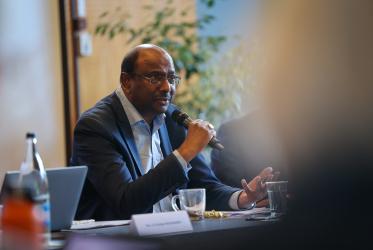“Following World War II, the need for a global Christian organization was brought to fruition with the World Council of Churches, based on two crucial principals: an actual dialogue on theological issues and the need for joint social action,” he said. “Today, the ecumenical movement is at a crossroads.”
If we do not place the issue of unity and communion at the center of our commitment, we will lose the authenticity of our relationships and the common goal that brings us together, said the Ecumenical Patriarch. “We have excellent and very talented theologians working on various aspects of our doctrine.”
But the dialogue of love also needs symbols, actions and encounters that embody our desire for unity, he added.
“Allow us to offer one example of the kind of ecumenical milestone to which we are committed regarding an issue dear to our heart: the protection of the environment,” he said. “Our common care for the natural environment has become a tangible opportunity to explore the mystery of unity.”
We cannot have two ways of looking at the world: one, religious and another one, worldly, the Ecumenical Patriarch continued. “We cannot separate our concerns for human dignity, human rights, or social justice from our concerns for ecological preservation and sustainability,” he said. “These concerns are closely linked.”
He reflected that the way we relate to nature directly reflects the way we relate to God and to our fellow human beings.
“We have repeatedly stated that the crisis we are facing today is not primarily ecological,” he said. “It is a crisis in the way we perceive and conceive of the world.”
We treat our planet in a sacrilegious way, precisely because we fail to see it as a gift from above, he said. “Therefore, before we can effectively deal with problems of our environment, we, as Christian ministers, must change the way we see the world and society,” he urged. “Otherwise, we are simply dealing with symptoms and not their causes.”
We require a new worldview, he said. “We need to open our hearts to the language of dialogue,” he said. “This is the ultimate condition for the restoration of unity among Christians.”
The path to Christian unity has been neither peaceful nor painless, he acknowledged. “Unity is a task that remains difficult to fulfill.”
Love is essential, so that dialogue between our churches can occur in all freedom and trust, he concluded. “Then, we will acknowledge that the divergences originating from different ways in which churches respond to moral problems are not necessarily insurmountable, since churches witness to the gospel in different contexts,” he said. “Let us, therefore, process with hope along the path toward our restored unity.”
The National Council of Churches held an ecumenical reception for the Ecumenical Patriarch at the Simpson Chapel in the United Methodist Building on Capitol Hill.







